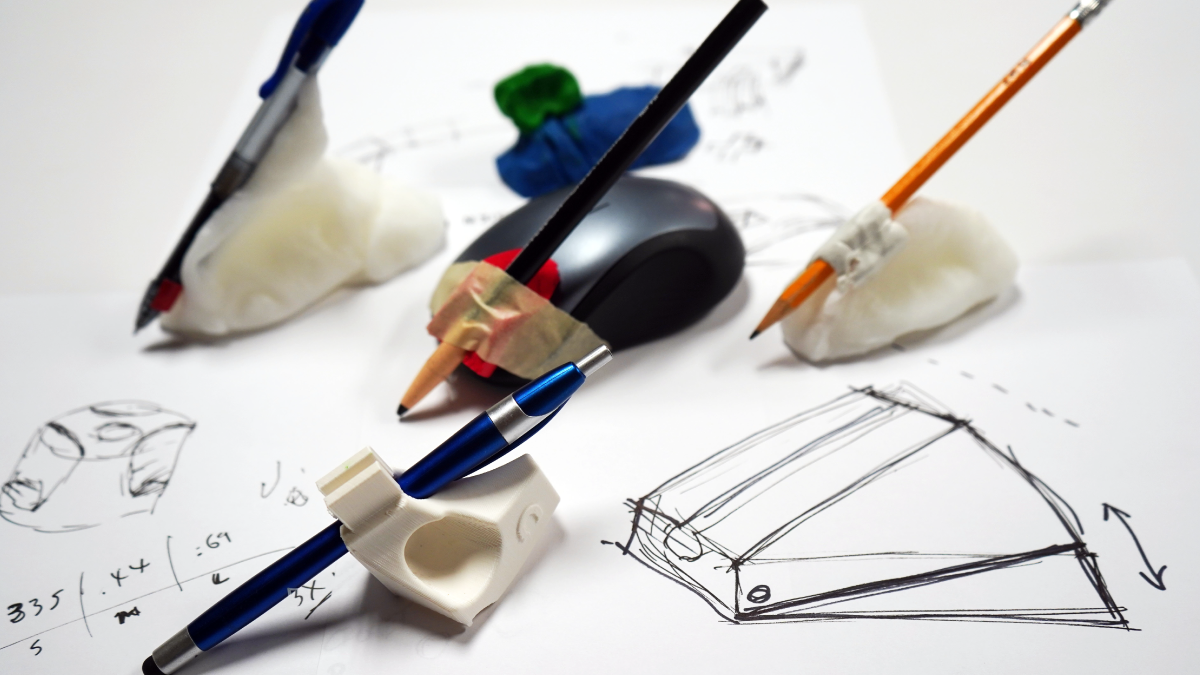
Industrial Design, Rapid Prototyping Tech, and the Co-creation of Assistive Tech
Georgia Tech’s School of Industrial Design distinguishes itself through its commitment to the end-user and its multidisciplinary approach to problem-solving. Through rapid prototype iteration and a focus on people, industrial design students gain valuable practice in empathetic design that was put to the challenge to truly change one woman’s life.
In a collaborative effort to improve the user experience for an end-user, School of Industrial Design’s Assistant Professor Leila Aflatoony, Professor Jon Sanford, and Ph.D. student and CIDI research scientist, Su Jin (Susan) Lee, partnered up with students and occupational therapists to explore rapid prototyping methods in the creation of custom tech solutions for users with mobility impairments.
The partnership and project offered a four-part design workshop for four Georgia Tech industrial design students and four occupational therapists from Emory Health and Brenau University.
Collectively, their goal was to iterate and co-design a device to reduce and even end the pain for Cheryl Laurendeau, an active senior citizen in the Atlanta community. The group leveraged their distinctive areas of expertise and put their brainpower together to create an assistive tool that could accommodate the pain associated with holding a writing utensil.
“Occupational therapy and industrial design are two professions that are well poised to collaborate. If done well, they can have additive effects enabling the achievement of greater outcomes for end-users than can’t be achieved by either profession alone,” said Aflatoony.
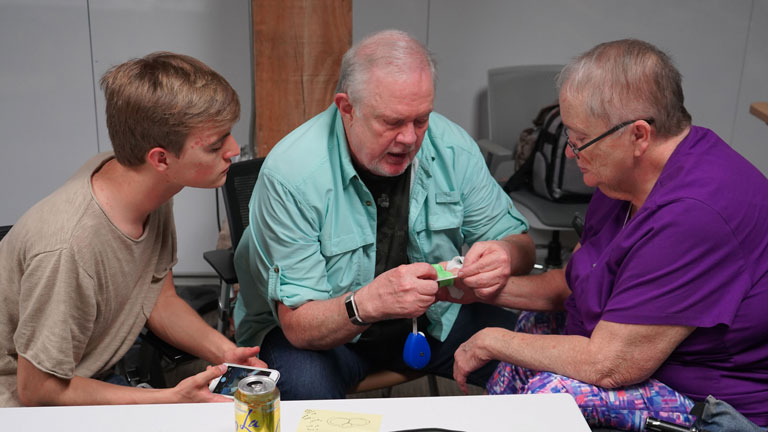
Although a polio survivor, Laurendeau’s pain stems from the effects of post-polio syndrome; a condition that lingers and affects survivors’ years after recovery from the initial acute attack of the poliomyelitis virus. Laurendeau’s circumstances have never stopped her from growing. She actively attends classes and engages in extensive writing for class notes, an effort that is fundamental to her success while studying, but difficult for her.
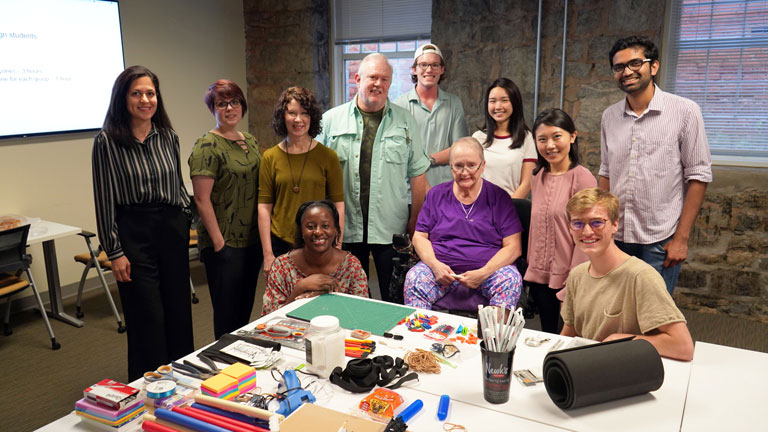
More often than not, customized assistive technology solutions are not within the reach for most who need it due to the fact that they are costly and time extensive to develop. Rapid prototyping methods, like those practiced by Georgia Tech’s School of Industrial Design, could create a more accessible development model that offers increasingly client-centered solutions to accommodate user preferences and abilities.
Throughout the workshop, the interdisciplinary team examined various ideas and models. From experimenting with modifying off-the-shelf solutions and creating DIY devices using materials such as thermoplastic and Velcro, to 3D printing, iteration and testing were key to helping Laurendeau.
“Right now, I really need the help because my arms are killing me. I’ve enjoyed learning from the experience and have learned some more about my own disability, and what to look out for,” Laurendeau said.
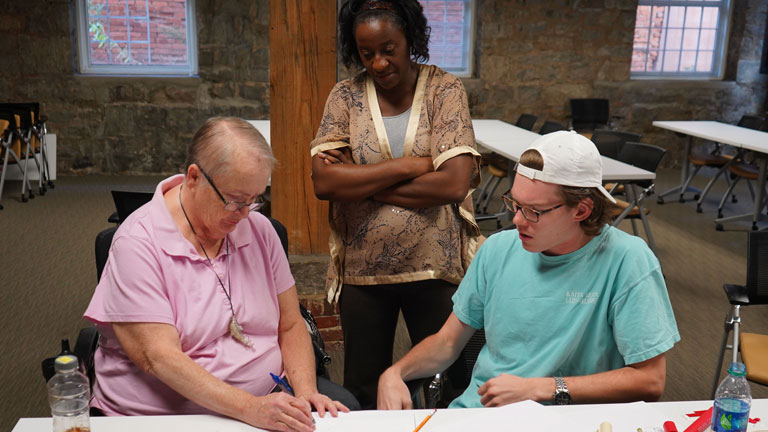
“The process of having occupational therapists (OTs) together with the design students was really great. I think the average design student doesn't know a lot about medical or physical kinds of things and having the OT professionals there to tell them what people experience helped them formulate ideas,” Laurendeau said.
The collaboration resulted in extremely beneficial outcomes. Designers were able to leverage their specialty to articulate more robust design requirements based on a sophisticated proposition derived from therapists’ clinical expertise and knowledge about the functional implications of Laurendeau’s disability.
Through creativity, visual communication skills, and 3D modeling skills, industrial design students supported solutions that were responsive to design requirements and user feedback.
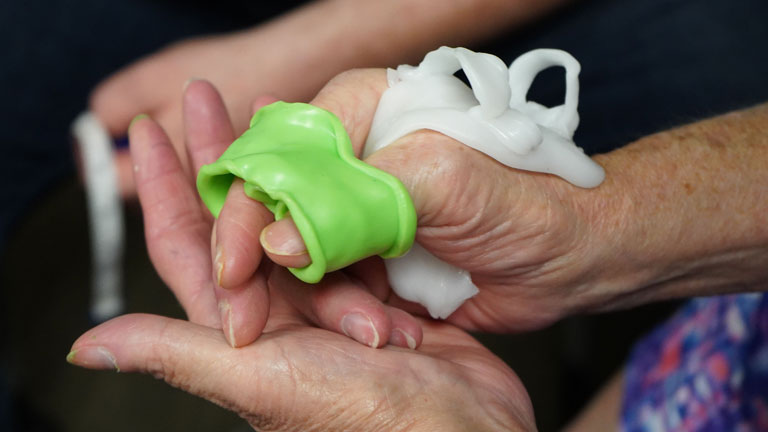
Custom tools were designed and printed, and multiple prototypes were tested that not only leveraged the specific properties of 3D printing – rapid, iterative, and customizable – but also provided continued insight into ideas to best optimize Laurendeau’s assistive writing device.
For industrial design senior, Jonathan Schmidt, the biggest takeaway from the workshop was the experiential fulfillment of working directly with the end-user and collaborating and learning from OT professionals.
“While Ms. Laurendeau’s condition limits her in many ways, she remained hopeful that we could come up with a way to preserve her ability to write. This motivated me throughout the process and makes me want to improve my design skills to better collaborate with users in the future,” said Schmidt.
Likewise, seniors Ian Harmon, Zijie Zeng, and recent grad, Neeraj Rao, concurred on the value created through good collaboration and the potential to enhance outcomes for underserved end-users.
“I learned that occupational therapists encounter a lot of problems that don’t have a direct market solution. I don't think they have a solution for what to do when a user/patient comes with a unique problem with no market solution – this presents a good opportunity to help make new products,” said Rao.
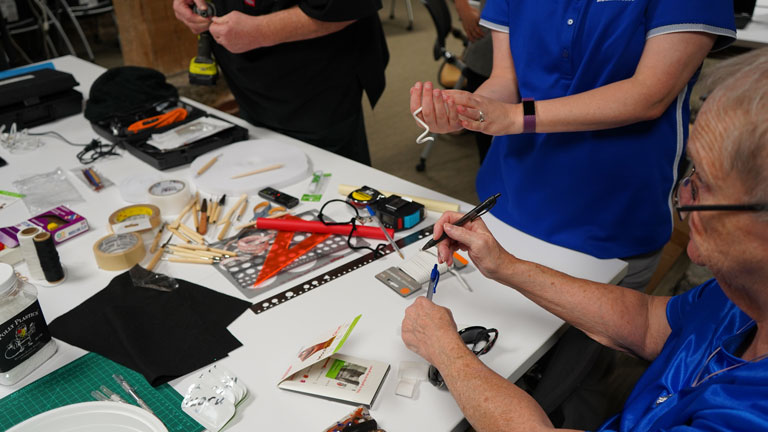
For occupational therapists Dr. Tamara Mills, Traci Swartz, Rebekah Buehler, and Charley Berstecher, this workshop presented them with the opportunity to realize their ideas using a 3D printer, and explore methods typically used by industrial designers to test ideas at early stages.
“One thing I came away with was how nice and how beneficial it would be for the patients or clients if we could work with designers in healthcare for solutions outside the prefab ones. It would be so nice to have a designer available,” said occupational therapist, Traci Swartz.
Aflatoony, Sanford, and Lee continue to be motivated to understand how to facilitate interdisciplinary collaboration, in a way that’s responsive to real life constraints.
Leila Aflatoony will be presenting the outcomes of this workshop at Design Principles & Practices conference in March and Lee will be presenting at the AOTA (American Occupational Therapy Association) Annual conference in April.
If you wish to learn more about assistive tech, please contact Leila Aflatoony.